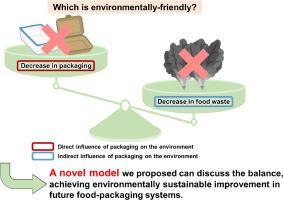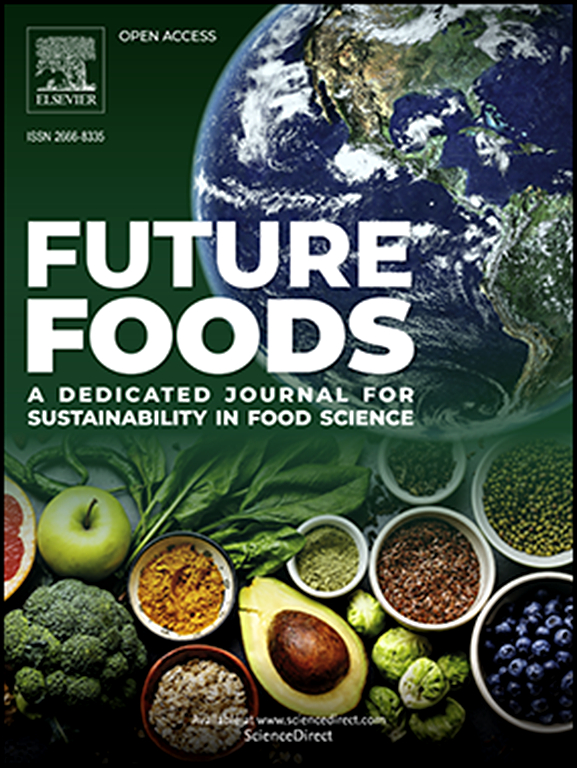A novel simplified model to evaluate environmental impact based on life cycle assessment methodology–Case study of spinach considering food waste reduction through modified atmosphere packaging–
IF 8.2
Q1 FOOD SCIENCE & TECHNOLOGY
引用次数: 0
Abstract
Greenhouse gases (GHGs) from food loss and waste (FLW) act as a major hindrance to achieving the Sustainable Development Goal 13. Modified atmosphere packaging (MAP) can reduce the FLW of packaged fruits and vegetables, decreasing FLW-related GHGs. This study assessed the influence of food waste reduction (FWR) via MAP on the environmental load of the spinach life cycle. Particularly, we introduced a novel model to estimate the environmental loads of the life cycle. Additionally, we employed the model for the life cycles of strawberries and peaches to verify the suitability of the model to other product's life cycles. Furthermore, we assessed the trade-offs between the increase in the environmental loads attributed to MAP production and the decrease in the environmental loads of the spinach life cycle via FWR. FWR via MAP decreased the environmental loads of the spinach supply chain by 45.2 % compared to the waste reduction via oriented polypropylene packaging, although MAP increased the environmental loads for packaging production. Further, the proposed model could suitably predict the environmental loads of the life cycles of spinach and other products, irrespective of the packaging conditions (film, box, or tray), thereby contributing to environmentally sustainable improvements in future food-packaging systems.

基于生命周期评估方法的新型环境影响评估简化模型--考虑通过改良气调包装减少食物垃圾的菠菜案例研究
食物损耗和浪费(FLW)产生的温室气体(GHG)是实现可持续发展目标 13 的主要障碍。气调包装(MAP)可以减少包装水果和蔬菜的食物损耗,从而减少与食物损耗相关的温室气体。本研究评估了通过 MAP 减少食物垃圾(FWR)对菠菜生命周期环境负荷的影响。特别是,我们引入了一个新模型来估算生命周期的环境负荷。此外,我们还将该模型用于草莓和桃子的生命周期,以验证该模型是否适用于其他产品的生命周期。此外,我们还评估了因 MAP 生产而增加的环境负荷与通过 FWR 减少菠菜生命周期环境负荷之间的权衡。与通过定向聚丙烯包装减少废物相比,通过 MAP 进行的全废物回收将菠菜供应链的环境负荷降低了 45.2%,尽管 MAP 增加了包装生产的环境负荷。此外,无论包装条件如何(薄膜、包装箱或托盘),所提出的模型都能适当预测菠菜和其他产品生命周期的环境负荷,从而有助于未来食品包装系统的环境可持续改进。
本文章由计算机程序翻译,如有差异,请以英文原文为准。
求助全文
约1分钟内获得全文
求助全文
来源期刊

Future Foods
Agricultural and Biological Sciences-Food Science
CiteScore
8.60
自引率
0.00%
发文量
97
审稿时长
15 weeks
期刊介绍:
Future Foods is a specialized journal that is dedicated to tackling the challenges posed by climate change and the need for sustainability in the realm of food production. The journal recognizes the imperative to transform current food manufacturing and consumption practices to meet the dietary needs of a burgeoning global population while simultaneously curbing environmental degradation.
The mission of Future Foods is to disseminate research that aligns with the goal of fostering the development of innovative technologies and alternative food sources to establish more sustainable food systems. The journal is committed to publishing high-quality, peer-reviewed articles that contribute to the advancement of sustainable food practices.
Abstracting and indexing:
Scopus
Directory of Open Access Journals (DOAJ)
Emerging Sources Citation Index (ESCI)
SCImago Journal Rank (SJR)
SNIP
 求助内容:
求助内容: 应助结果提醒方式:
应助结果提醒方式:


